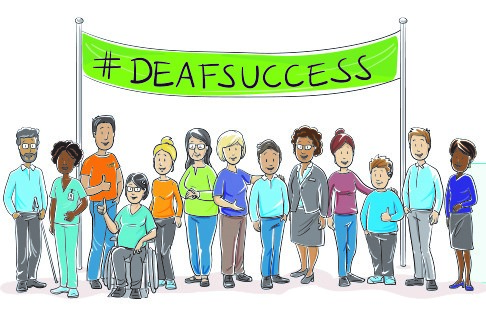[video:https://youtu.be/92GHlYKayEM]
In this video, Felicia Williams explains how microaggressions and other offensive thinking hurts people from marginalized communities. Read the full video description.
If you teach, supervise, or work with deaf people, how can you learn about the impact of your attitudes and biases on their daily experiences and create space to honor and support them? Learn how in Attitudes and Biases as Barriers for Deaf People, a new self-paced course now available in the free online learning library of the National Deaf Center on Postsecondary Outcomes (NDC).
A Root Cause of Barriers
Negative attitudes and biases are at the root of many societal barriers for deaf people. A blatant example is a professor shouting at a hard of hearing student in an online class. A more subtle example is having low expectations — in which very little is expected of a deaf student or employee, so very little is achieved at school or in the workplace.
What we say and do, regardless of intentions, has an impact on our interactions with others.
The intent may not align with the impact, yet the impact is harmful — in fact, it can prevent a deaf person from achieving their full potential.
A Root Cause of Significant Gaps
For deaf Americans, negative attitudes and biases against them can have lifelong ramifications. They are identified as one of the root causes of significant educational attainment and employment gaps between deaf and hearing people, according to NDC research — one of four contributing factors that are pervasive, persistent, and systemic.
Across the nation, only 48% of deaf people are employed (compared to 72% of hearing people) and only 18% receive bachelor’s degrees (compared to 33% of hearing people).
Besides creating very real barriers to achievement in schools and workplaces — especially for deaf people of color — negative biases about deafness are also taking a mental toll. Research shows that deaf people who internalize them are less resilient to stress and adversity.
Instead, a positive, fair approach can reap countless benefits for everyone. Parents, educators, employers, and other professionals who have high expectations for deaf people are crucial contributors to their success after high school. Research also shows that training on working with deaf people results in more positive attitudes about deafness.
Boost Awareness and Take Action
In three one-hour modules, Attitudes and Biases as Barriers for Deaf People blends real-world experiences with evidence-based research and innovative resources.
-
Module one defines and explains the behaviors, biases, and microaggressions that may cause harm to others, even when they are unintentional.
-
Module two addresses the complexity of deaf identity. It explores ethnic and cultural diversity in the deaf community, multiple marginalized identities, and the differentiation of the experiences of deaf people of color, as well as the systemic oppression that results in barriers to education and employment opportunities.
-
Module three guides participants through introspection and action, providing online resources and activities to assess bias, find cultural humility, engage in open dialog, and ensure personal accountability in a cycle of unpacking, unlearning, and learning.
After completing the course, participants will have increased knowledge and skills necessary to recognize how an individual’s privileges and biases can create barriers for deaf success and contribute to systemic oppression; formulate strategies to reduce them in educational, employment, and other settings; and examine personal interactions and plan action steps to create change.
Unlike many other professional development opportunities that address working with the deaf community, this is a deaf-centered course. Created by the deaf-led team at NDC, it includes compelling perspectives from deaf people, who explain firsthand the effects of negative attitudes, microaggressions, and marginalization in their lives. They also highlight the nuances that are essential to remember when working with a diverse deaf population.
Earn Professional Development Credits for Free
Attitudes and Biases as Barriers for Deaf People is free and open to all. It is a self-paced, online professional development course designed for anyone who works with or wants to learn more about the deaf community. With a passing score of 80% or above, participants receive a certificate of completion. This course is approved for 0.3 RID PPO CEUs (3 CRC clock hours pending).









